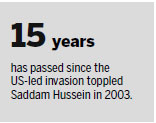A chance to chart post-IS future in Iraq
BAGHDAD - Iraqis head to the polls this weekend for the first time since the government declared victory against the Islamic State extremist group.
The May 12 election, the fourth since the 2003 US-led invasion that toppled Saddam Hussein, will be dominated by the same leaders and factions that emerged 15 years ago. But the atrocities committed by IS against fellow Sunnis, the hard-fought national campaign against the extremist group and new rifts among the dominant Shiite blocs seem to have eased the sectarian tensions that marked past votes.
The main fault-line is between Prime Minister Haider al-Abadi, who has deftly balanced influences of the United States and Iran, and other Shiite politicians seen as closer to Iran.
Iraqis, meanwhile, expect little from what is sure to be another fractious coalition government. Fifteen years after the US invasion, the country still suffers from widespread power outages and poor public services, and low oil prices have further eviscerated the economy.

In Sunni-majority areas, where the war against the IS group destroyed vital infrastructure and countless homes, the challenges are even greater.
The contenders
Nearly 7,000 candidates are vying for 329 parliament seats. No single alliance appears capable of winning a majority, so the eventual government will be formed after horse-trading that could drag on for months. After the elections in 2010, it took eight months to form a new government.
The candidates leading the most powerful alliances are al-Abadi, former prime minister Nuri al-Maliki and Hadi al-Amiri, a former minister of transport who also led paramilitary fighters against IS.
Abadi, who assumed office shortly after IS swept across much of northern and western Iraq, presided over the campaign that eventually drove the group from virtually all the territory it once controlled. He's seen as an urbane technocrat who has maintained good relations with Washington and Teheran.
He also appears best placed to reach beyond the country's Shiite majority and court Sunni votes, which could provide a margin of victory in a close-fought race.
Maliki, who governed Iraq for eight years, remains a powerful figure despite having stepped aside in disgrace when the military crumbled in the face of IS.
Amiri was a commander in the Popular Mobilization Forces, the mostly Shiite militias who helped push back the extremists.
As with previous elections, Shiite cleric Muqtada al-Sadr, who also commands a state-sanctioned militia, is expected to translate his popular following into enough votes to make him a key player during government formation negotiations. His fighters once battled US troops, and he remains opposed to any US presence in Iraq.
The US-led coalition played a key role in the defeat of IS. But since Abadi declared victory over the group last year, there have been mounting calls for the US to withdraw.
About 5,200 US troops remain in Iraq, according to figures released by the Pentagon in December.
Associated Press
(China Daily 05/09/2018 page11)














